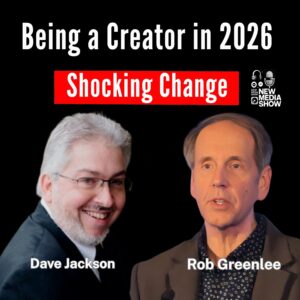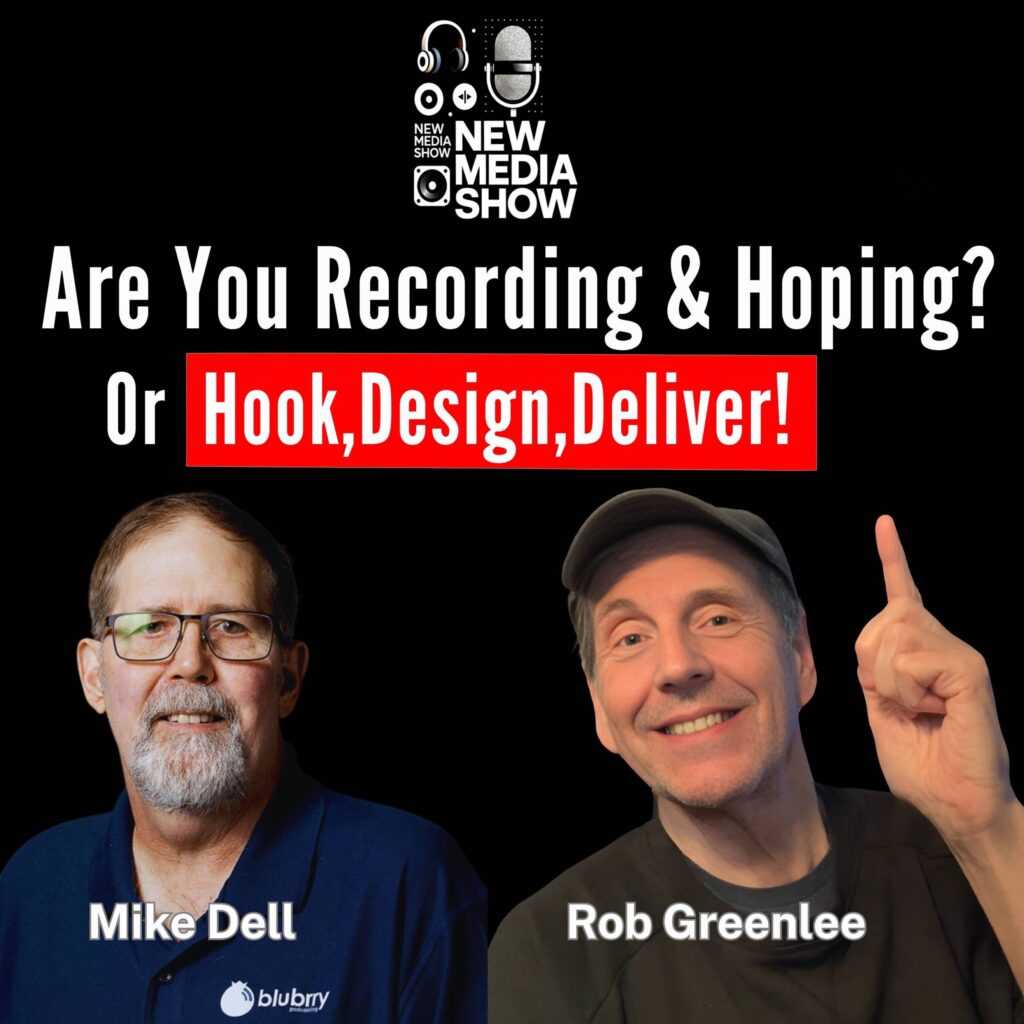 AI-generated podcast hosts and shows are rapidly changing podcasting, video podcasting, and the creator economy across all distribution platforms, including AI LLMs.
AI-generated podcast hosts and shows are rapidly changing podcasting, video podcasting, and the creator economy across all distribution platforms, including AI LLMs.
In this episode of The New Media Show Live #650 from Feb 4th, 2026, Host Rob Greenlee, CEO/Founder of Trust Factor Lab, explores how AI-generated podcasts affect people, trust, and the future of media with Jeanine Wright, Co-Founder and CEO of Inception Point AI.
Jeanine Wright will help us better understand what Inception Point AI is building and why AI-generated personalities are different from human-created podcasts and AI-assisted editing tools.
This conversation is designed to help podcasters, creators, media executives, and advertisers understand AI-generated podcast content without fear. It will be a clear, accurate discussion about how synthetic hosts work, how audiences respond emotionally, and what the next 12 to 24 months may look like as AI improves.
As humans seem to be rejecting AI-generated content, its human consumption is growing and quality is rapidly improving.
Key topics covered in this 60-minute conversation
-AI-generated podcast hosts and synthetic media explained in plain language
-How AI personalities are created using story plus technology
-How listeners build trust and emotional attachment with AI voices
-Disclosure and transparency for AI-generated content
-Authenticity and credibility in AI-created podcasts versus human-created podcasts
-Ethics, consent, voice, likeness, and IP issues in synthetic media
-Brand safety, advertising readiness, and monetization for AI-hosted shows
-Platform discovery and distribution when AI content volume explodes
-What human creators should do now to stay differentiated and future-proof?
-Practical strategies for building trust and growth in 2026 and beyond
Who this episode is for
-Podcast creators and video creators
-Media companies, podcast networks, and platform teams
-Advertisers and brand safety leaders
-Listeners curious about AI-generated content and the future of podcasting
Watch live at YouTube.com/@RobGreenlee and join the conversation
Watch On-Demand/Podcast Audio and Video Versions at https://newmediashow.com
Guest
Jeanine Wright, Inception Point AI
https://www.inceptionpoint.ai
Host
Rob Greenlee
https://robgreenlee.com
https://www.youtube.com/@RobGreenlee
https://www.youtube.com/@spokenhuman
https://www.linkedin.com/in/robgreenlee
https://www.instagram.com/robwgreenlee
https://x.com/robgreenlee
https://AdoreNetwork.com
https://PodcastHall.com
00:00 Introduction to the New Media Show
00:55 Guest Introduction: Janine Wright
01:42 Addressing AI Controversies
05:18 AI’s Impact on Jobs and Content Quality
13:36 Exploring AI-Generated Content
14:41 AI Personalities and Content Creation
22:42 Future of AI in Content Creation
31:32 Transparency and Ethical Considerations
43:25 Human Creators in an AI-Driven World
46:40 Exploring Swap Farms and Bot Traffic
47:28 The Evolution of Podcast Quality
50:45 AI in Video Content Creation
52:20 Digital Clones and Ethical Considerations
56:50 AI Personalities and Content Creation
01:04:19 The Future of AI in Podcasting
01:23:09 Advertiser Reactions and Industry Impact
01:25:43 Final Thoughts and Future Conversations
Podcast: Play in new window | Download
Subscribe: Apple Podcasts | Android | Blubrry | Podcast Index | RSS
Podcast (audio): Play in new window | Download
Subscribe: Apple Podcasts | Spotify | Android | Blubrry | Podcast Index | RSS

 This week in episode 649 of the New Media Show, Rob Greenlee is joined by Jordan Harbinger to unpack the question creators ask nonstop in 2026:
This week in episode 649 of the New Media Show, Rob Greenlee is joined by Jordan Harbinger to unpack the question creators ask nonstop in 2026: The New Media Show #648 Live On-Stage at Podfest Expo (Jan 16, 2026)
The New Media Show #648 Live On-Stage at Podfest Expo (Jan 16, 2026) The New Media Show with Rob Greenlee is joined live by Ralph Estep Jr, licensed accountant and host of The Content Creators Accountant, to break down the simple money systems creators need to turn creator chaos into calm financial clarity. If you earn from YouTube AdSense, brand deals and UGC, affiliate income, memberships and subscriptions, courses, coaching, digital products, or PayPal and Stripe payouts, this episode is built for you.
The New Media Show with Rob Greenlee is joined live by Ralph Estep Jr, licensed accountant and host of The Content Creators Accountant, to break down the simple money systems creators need to turn creator chaos into calm financial clarity. If you earn from YouTube AdSense, brand deals and UGC, affiliate income, memberships and subscriptions, courses, coaching, digital products, or PayPal and Stripe payouts, this episode is built for you. In this new episode from a LIVE Jan 7th, 2026 New Media Show, Host
In this new episode from a LIVE Jan 7th, 2026 New Media Show, Host  This week (December 17th, 2025) on episode #645 of The New Media Show with
This week (December 17th, 2025) on episode #645 of The New Media Show with 
 In this episode, we relaunch the New Media Show #643 with special guest Rob Walsh, VP of Libsyn.
In this episode, we relaunch the New Media Show #643 with special guest Rob Walsh, VP of Libsyn. On this special New Media Show tribute episode, we honor the life and legacy of Todd Cochrane, podcasting pioneer, podcast hall of famer, founder of Blubrry and RawVoice, host of Geek News Central podcast, author of one of the first podcasting books, and co-host on The New Media Show for 13 years.
On this special New Media Show tribute episode, we honor the life and legacy of Todd Cochrane, podcasting pioneer, podcast hall of famer, founder of Blubrry and RawVoice, host of Geek News Central podcast, author of one of the first podcasting books, and co-host on The New Media Show for 13 years.